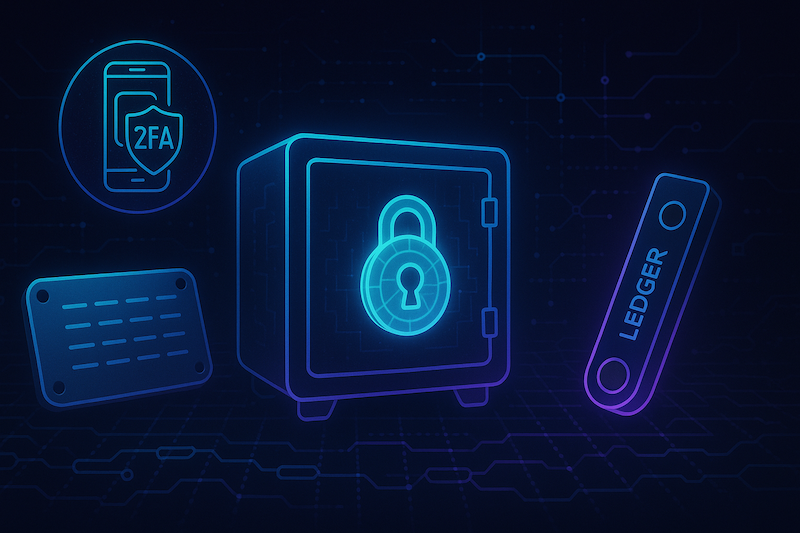 The recent incident involving crypto blogger Aman, who was attacked by malicious actors, serves as a wake-up call for everyone involved in cryptocurrencies. The attack, which resulted in the theft of his Telegram account, a channel with 45,000 subscribers, and assets worth over $300,000, highlights the critical importance of following security measures. We’ve compiled practical tips to help you safeguard your funds and personal information.
The recent incident involving crypto blogger Aman, who was attacked by malicious actors, serves as a wake-up call for everyone involved in cryptocurrencies. The attack, which resulted in the theft of his Telegram account, a channel with 45,000 subscribers, and assets worth over $300,000, highlights the critical importance of following security measures. We’ve compiled practical tips to help you safeguard your funds and personal information.
Enable Two-Factor Authentication (2FA)
Two-factor authentication is a fundamental layer of protection for all your accounts, whether it’s Telegram, crypto wallets, or exchanges. 2FA adds an extra security step by requiring not only a password but also a code sent to your device or generated by an authenticator app.
How to do it: In the settings of Telegram, crypto wallets (e.g., MetaMask, Trust Wallet), or exchanges (e.g., Binance, Bybit), enable 2FA using an app like Google Authenticator or Authy. Avoid using SMS for codes, as they are vulnerable to interception.
Why it matters: Even if attackers obtain your password, they cannot access your account without the second factor.
Store Seed Phrases Securely
Your seed phrase is the key to your crypto wallet. If it falls into the wrong hands, you risk losing all your assets. Storing your seed phrase on a phone, computer, or in the cloud is highly risky.
How to do it: Write down your seed phrase on paper and keep it in a secure location, such as a safe or a bank vault. Consider using metal plates to protect it from fire or water damage.
Why it matters: In Aman’s case, attackers could have accessed his wallets if his seed phrase was stored on a device. Physical storage eliminates the risk of digital hacks.
Use a Separate "Clean" Phone for Public Activities
If you’re active in the crypto community, run a blog, or communicate via Telegram, use a separate device that doesn’t have access to your main wallets or sensitive data.
How to do it: Purchase an affordable smartphone for social media, posting, and other public activities. Keep your primary device reserved for crypto wallets and critical apps, and avoid using it for everyday tasks.
Why it matters: Attackers may track your activity and gain access to your device. A "clean" phone minimizes these risks.
Avoid Storing Funds on Centralized Exchanges
Centralized exchanges (CEX) are convenient for trading but are vulnerable to hacks, account freezes, or platform bankruptcies.
How to do it: Move your assets to non-custodial wallets (e.g., hardware wallets like Ledger or Trezor) after trading. Use exchanges only for necessary transactions. Purchase hardware wallets directly from the manufacturer, never from secondary markets, even if they appear new and packaged.
Why it matters: Storing funds on exchanges makes you dependent on their security. A hack or data breach could result in total loss.
Don’t Flaunt Your Wealth or Assets
Boasting about expensive purchases or large crypto holdings attracts scammers and malicious actors. Aman’s story shows how envy can lead to physical threats.
How to do it: Avoid posting photos, videos, or content that hints at your wealth. Refrain from sharing screenshots of balances or transactions on social media.
Why it matters: Attackers often target victims by monitoring their social media activity. Discretion is your protection (money loves silence).
Prepare for Device Loss: Create a Checklist
Imagine your phone is stolen or lost. What’s your plan? A pre-prepared checklist can help you quickly regain access and minimize losses.
How to do it:
- List all crypto-related accounts (wallets, exchanges, Telegram).
- Ensure you have access to 2FA backup codes and seed phrases.
- Keep contact details for support teams of exchanges and wallets.
- Set up remote device locking via services like Google Find My Device or iCloud.
Why it matters: In Aman’s case, stolen Telegram access led to the loss of his channel and assets. A checklist enables quick action in such scenarios.
Be Cautious with Physical Security
Aman’s incident demonstrates that crypto assets attract not only hackers but also physical criminals. Attackers may use social engineering, like employing distractions to bypass security measures.
How to do it:
- Don’t open the door to strangers, especially if you’re known in the crypto community.
- Install home security cameras and alarms.
- Avoid sharing your real-time location.
Why it matters: Physical attacks may be planned based on your public activity. Home security and cautious communication are key.
Conclusion
Cryptocurrencies offer freedom and opportunities but come with risks. Aman’s story is a reminder that security must be a priority. Enable 2FA, store seed phrases securely, use a separate device for public activity, avoid keeping funds on exchanges, refrain from flaunting wealth, and prepare for unexpected situations. These simple steps will help protect your assets and personal data from malicious actors. Stay cautious and vigilant!
If you want to stay updated on news and our latest posts, subscribe to our Telegram channel.









